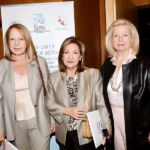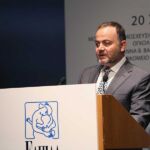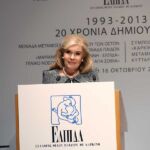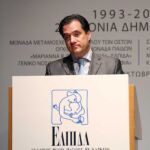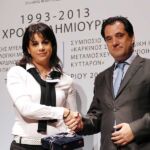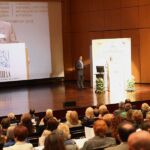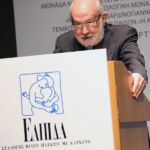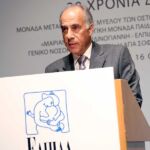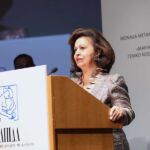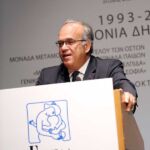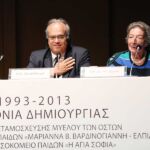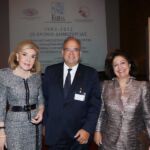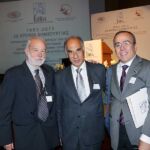The optimistic message that childhood cancer can be defeated was sent by the distinguished Greek and foreign clinicians and medical researchers who took part in a medical symposium entitled CHILDHOOD CANCER HAEMATOPOIETIC CELL TRANSPLANTATION, which was held on the occasion of the 20th Anniversary of the Paediatric Bone Marrow Transplant Unit in Greece.
Impressive facts about the battle waged every day by the side of children with cancer and the significant progress that has been made in recent years in the field of Haematopoietic Cell Transplantation were all presented at the medical symposium on childhood cancer which took place at the MEGARON Athens Concert Hall on Wednesday 16 October 2013.
The Symposium was organised by the ELPIDA Association of Friends of Children with Cancer, in collaboration with the Hellenic Society of Haematology, to celebrate 20 years of operation of the Paediatric Bone Marrow Transplant Unit in Greece, which was founded by ELPIDA in 1993 at the Agia Sofia Childrens Hospital.
The Symposium was opened by the President of the ELPIDA Association, Mrs Marianna V. Vardinoyannis: ”We are delighted to welcome you to the medical symposium held by our Association on the 20th anniversary of the Bone Marrow Transplant Unit. We have invited you here with great excitement, as we always have when our work has reached a landmark point in its course. We want to share such moments with the medical community, the doctors, nurses, researchers and people who have dedicated their lives to the battle against cancer. We would like to give you a forum from which to send out into society your own hope-filled message that cancer can be defeated . ELPIDA began its long journey twenty-three years ago. Today, we are at the heart of this journey, having to our credit not only the Transplant Unit, but also the Hospital that receives 80% of childhood cancer cases in Greece, and many cases from neighbouring countries. Of these, three out of four children return home completely cured. Thanks to our Oncology Hospital, children of Greece are amongst the 20% of the world’s children who have access to advanced medical care against cancer. We also have our Guest House, which acts as a second home for the children’s families for as long as their treatment lasts, and provides invaluable psychological support. Facing the future that stands before us, we are optimistic and strong, drawing our strength from the children of ELPIDA themselves, and maintaining a zero-tolerance policy towards any sort of half-measure when it comes to a childs’ life. For this reason, we will not stop here. We will take new steps that will complement what we already offer to children with cancer and their families. Very soon, the Bone Marrow Donor Bank will be inaugurated, which we have named as “Orama Elpidas” (meaning ELPIDA’s Vision). The Bank will be housed in the Hospital and will become a way to find donors more quickly and at less expense for those children who need them. At the same time, we are in the process of establishing a National Transplant Centre. It will be the first in Greece specifically for children, for transplanting solid organs. This will fill a huge gap in healthcare, in an area of particular importance to many Greek families. Our third plan is to create a Centre of Excellence for specialised research into cancer treatment. In all of these endeavours, we need you by our side .”
During her speech, Mrs Vardinoyannis also thanked all the speakers for taking part in the symposium, particularly professors David Khayat from France, Giuseppe Masera from Italy and Νamik Yasar Ozbek from Turkey, who had travelled to Athens despite their busy schedules to take part in the symposium and ELPIDA’s anniversary event. Mrs Vardinoyannis also congratulated the symposium’s organising and scientific committee: Professor of Haematology at the Democritus University of Thrace and President of the Hellenic Society of Haematology, Mr Konstantinos Tsatalas; Emeritus Professor of Genetics and Paediatrics at the University of Athens and member of the ELPIDA Board of Directors Mrs Ekaterini Metaxotou; and Director of the Bone Marrow Transplant Unit, Dr Stelios Grafakos. She also thanked the journalist Michalis Kefalogiannis for moderating the symposium’s opening.
The Symposium was addressed by the Greek Health Minister Mr. Adonis Georgiades; HRH Crown Princess Katherine of Serbia, President of the Lifeline Foundation; Emeritus Professor of the University of Athens and President of the National Transplant Organisation Mr Alkiviadis Kostakis; Professor of Haematology and President of the Hellenic Society of Haematology, Mr Konstantinos Tsatalas; Professor of Paediatrics Mr Giuseppe Masera; Director of the Agia Sofia Childrens Hospital Mr Emmanouil Papasavvas; and Associate Professor of Medicine at the University of Athens, Paediatrician and Haematologist Dr Stelios Grafakos.
The addresses were followed by the presentation of an award to Mrs Ekaterini Boukla, mother of two children who need bone marrow transplants and founder of the “Rodavgi” Association in the island of Rhodes which works for raising awareness on the bone marrow donations. The award was presented by the Health Minister, who congratulated Mrs Boukla for her contribution to the battle.
The symposium topics were the following: the 20 years of activities of the paediatric Transplant Unit; the achievements and expectations in the field of haematopoietic cell transplantation; and the importance of volunteer bone marrow donors. More specifically, the participants exchanged opinions and experiences on subjects such as the suitability and provenance of potential donors and transplant material, the growing number of transplants involving donors who are not related to the patient and who are found through international volunteer donor banks and cell blood banks, the importance of the operation of the Volunteer Donor Bank, the special procedure of extracting haematopoietic cells from underage siblings/donors, the offer of transplant material from unrelated volunteer donors etc.
CONCLUSIONS
As highlighted by the symposium, the good news in the field of Haematopoietic Cell Transplantation (HCT) is that significant progress has been made which, as the leading scientists who took part in the symposium explained, is due to the new methods and techniques being applied, better support for patients and the increased number of bone marrow donors. A contributing factor is the significant increase in centres for volunteer bone marrow donors worldwide. Volunteer donors are registered in many countries, and their total number globally exceeds 22 million. Since the chances of a compatible related donor (usually a sibling) being found for a patient requiring HCT are 30%, most transplants now involve volunteer donors who are not related to the patient. Thanks to these enlightened individuals, the volunteer donors of bone marrow, many more people can now be saved through HCT.
It was also emphasised that:
Umbilical cord blood is a valuable source of haematopoietic cells which can also be used with very good results. Even when there is no compatible donor, whether related or an unrelated volunteer, special methods have now been developed that enable transplantation from a relative (usually a parent) who is incompatible, a solution that was not possible in the past. The results of these transplants, which are potentially high risk, have been satisfactory, so today it seems that any patient requiring HCT can have one and thus remain hopeful about their future.
The audience was also impressed by a presentation on the activities of the Paediatric Bone Marrow Transplant Unit during its 20 years of operation and, through this, the extent of the contribution made by ELPIDA. It is the only paediatric Bone Marrow Transplant Unit in Greece and initially operated in the Agia Sofia Childrens Hospital. Since 2010, it has been housed in the “Marianna V. Vardinoyannis-ELPIDA” Children’s Oncology Hospital. It has 18 beds. It carries out approximately 60 transplants every year. From 1993 to date, the Unit has carried out 670 transplants on children diagnosed with particularly serious and life-threatening diseases such as leukaemia, aplastic anaemia, lymphomas, solid childhood tumours, hereditary immunodeficiencies, thalassaemia etc. The survival rate for patients for most of these diseases is over 70% and 95% for thalassaemia, which is one of the highest rates globally. The Unit applies the most up-to-date methods of treating patients and carries out all types of Haematopoietic Cell Transplants using related or unrelated volunteer donors.
CONCLUSION: Childhood cancer can be defeated!


